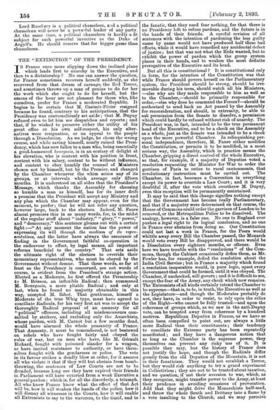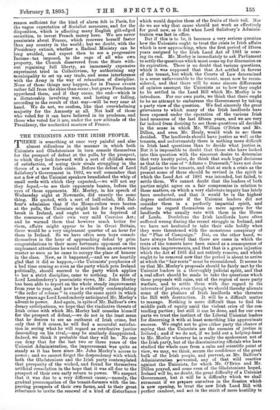THE "EXTINCTION" OF THE PRESIDENCY.
IS France once more slipping down the inclined plane which leads first to anarchy in the Executive, and then to a dictatorship ? No one can answer the question, for France sometimes recovers herself suddenly, as she recovered from that dream of carnage, the Red Terror, and sometimes throws up a man of genius to do for her the work which she ought to do for herself, but the omens of the hour are not pleasant for those who, like ourselves, prefer for France a moderated Republic. It begins to be certain that M. Casimir-Wrier resigned because he found, contrary to his anticipations, that the Presidency was contumeliously set aside ; that M. Dnpuy refused even to let him see despatches and reports ; and that, if he wished to preserve either the utility of his great office or his own self-respect, his only alter- natives were resignation, or an appeal to the people through a Dissolution. As we judge, he chose the wrong course, and while saving himself, nearly ruined the Presi- dency, which has now fallen to a man who, being essentially a good-humoured bourgeois, is in an ecstasy of delight at his elevation, who is content with his position in front, content with his salary, content to be without influence, and content to obey humbly the counsel of Ministers chosen not by himself, but by the Premier, and changed by the Chamber whenever the whim seizes any of its groups, or at intervals which average only fifteen months. It is understood on all sides that the President's Message, which thanks the Assembly for choosing so humble a man as himself, has for its inner drift a promise that the President will accept any Ministry and any plan which the Chamber may appear, even for the moment, to prefer; that he will not refer any question, however large, back to the electors. Indeed, M. Faure almost promises this in so many words, for, in the midst of the regular stuff about " industry," " glory," " power," and "democracy," this sentence gleams out with a certain light :—" At any moment the nation has the power of expressing its will through the medium of its repre- sentatives, and the latter have always the assurance of finding in the Government faithful co-operation in the endeavour to effect, by legal means, all important reforms beneficial to the country." That sets aside the ultimate right of the electors to override their momentary representatives, who must be obeyed by the Government without demur. That these words, so far at least as the Presidency is concerned, are not words of course, is evident from the President's strange action. Elected as a Moderate, he first offered the Premiership to M. Brisson, an inflexible Radical ; then summoned M. Bourgeois, a more pliable Radical ; and only at last, when he found no majority obtainable in this way, accepted M. Ribot. That gentleman, himself a Moderate of the true Whig type, must have agreed to conciliate Radicals, for his very first act was to accept the thoroughly Radical proposal of an amnesty for all " political' offences, including all misdemeanours com- mitted by strikers, and excluding only the Anarchists, whose pardon, with M. Carnot but a few months dead, would have alarmed the whole peasantry of France. That Amnesty, it must be remembered, is not bestowed on rebels who have fought fairly and obeyed the rules of war, but on men who have, like M. Gerault Richard, fought with poisoned slander for a weapon, or have incited resistance to authority, or have them- selves fought with the gendarmes or police. The vote in its favour strikes a deadly blow at order, for it assures all who violate it that if they will but abstain from bomb- throwing, the sentences of Law Courts are not to be dreaded, because long ere they have expired their friends in Parliament will have extorted from a weak Executive a general pardon ; which is, for all the disorderly, a triumph. All who know France know what the effect of that Act will be, how it will weaken the hands of the police, how it will dismay all witnesses in the Courts, how it will enable all Extremists to say to the waverers, to the timid, and to the fanatic, that they need fear nothing, for that there is no Presidency left to refuse pardons, and the future is in the hands of their friends. A careful revision of all sentences with the intention of pardoning the less guilty name by name would not have produced half these bad effects, while it would have remedied any accidental defect of justice ; but that was not what the Reds wanted, but to exhibit the power of pardon which the group system places in their hands, and to weaken the most definite prerogative of the Executive and its head.
But all this is constitutional ? It is constitutional only in form, for the intention of the Constitution was that while France should govern herself on the Parliamentary system, the President should be strong, should be irre- movable during his term, should watch all his Ministers, —else why are they made responsible to him as well as to the Chamber,—should be primarily responsible for order,—else why does he command the Forces?—should be authorised to send back an Act passed by the Assembly for reconsideration, and should, in extremity, be able to ask permission from the Senate to dissolve, a permission which could hardly be refused without risk of anarchy. The President was, in fact, intended to be the true permanent head of the Executive, and to be a check on the Assembly as a whole, just as the Senate was intended to be a check upon the more powerful Chamber. In relinquishing per- sonal independence, therefore, M. Faure either modifies the Constitution, or permits it to be modified, in a most serious way, the Assembly, which in practice means the Chamber, gripping a direct control of the whole Executive, so that, for example, if a majority of Deputies voted a resolution requesting the Minister for War to order the garrison of Paris to retire to rural cantonments, that revolutionary instruction must be carried out. The Chamber, in fact, becomes a Convention in everything except its power to override a Law Court ; and it is very doubtful if, after the vote which overthrew M. Dupuy, even this exception will be permanently maintained. It may be said that this change signifies nothing except that the Government has become really Parliamentary, and that if a majority were determined on that course, the House of Commons could order the garrison of London to be removed, or the Metropolitan Police to be dissolved. The analogy, however, is a false one. No one in England ever pushes a legal right to its logical conclusion, and no one in France ever abstains from doing so. Our Constitution could not last a week in France, for the Peers would whittle away every Bill the Chamber passed, the Monarch would veto every Bill he disapproved, and there would be a Dissolution every eighteen months, or oftener. Even here we have trouble with the "resolutions" of the Com- mons, though the Cabinet occasionally defies them, as Mr. Fowler has, for example, defied the resolution about the India Civil Service ; but in France a majority which found a resolution inoperative would, in pure logic, upset every Government that could be formed, until it was obeyed. The Chamber, if unchecked, will govern ; and it is difficult to see, except the fear of the Army, any check which now remains. The Extremists of all kinds certainly intend the Chamber to be supreme—that is to be, in truth, the Executive as well as the Legislature—and though the Moderates probably do not, they have, in order to resist, to rely upon the relics of the Right—who cannot be fully trusted—and upon the coherence of groups which, as we saw in the anti-Dupuy vote, can be tempted away from coherence by a hundred motives. Republican Deputies in France, as we have so often been compelled to point out, are always a little more Radical than their constituents ; their tendency to conciliate the Extreme party has been repeatedly manifested ; and they have a dangerous notion that so long as the Chamber is the supreme power, they themselves can prevent any risky use of it. It is possible they may, but the history of France does not justify the hope, and though the Radicals differ greatly from the old Deputies of the Mountain, it is not in their fanaticism. They would not establish a Terror, but they would risk anything to try a grand experiment in Collectivism ; they are not to be trusted about taxation, and we question, if not their aversion to war, which, as they recognise, might transfer power to the Army, at least their prudence in avoiding occasions of provocation. Add that they might drive the Monarchists half-mad, and throw the whole South and Brittany into a flame by a vote insulting to the Church, and we may perceive reason sufficient for the kind of alarm felt in Paris, for the vague expectation of Socialist measures, and for the disposition, which is affecting many English gilt-edged securities, to invest French money here. We are never pessimists about France, which recovers herself faster than any country in the world ; but we doubt, with the Presidency extinct, whether a Radical Ministry can be long avoided, and expect then to see a progressive Income - tax imposed, to the rage of all who own property, the Church dissevered from the State with- out regaining full liberty, an immensely expensive ,experiment tried in Collectivism, by authorising any municipality to set up any trade, and some interference with the Army in the way of relaxation of discipline. None of those things may happen, for in France events rather fall from the skies than occur; but grave Frenchmen apprehend them, and if they occur, the end—which is a dictatorship involving war, and lasting or falling, according to the result of that war—will be very near at hand. We do not, we confess, like that overwhelming majority for the Amnesty at all. Not half of those who voted for it can have believed in its prudence, and those who voted for it are, under the new attitude of the Presidency, the unchecked masters of France.



































 Previous page
Previous page